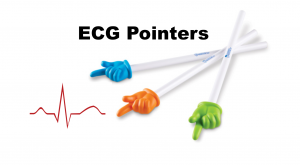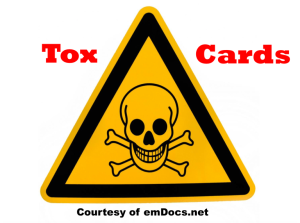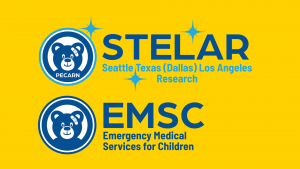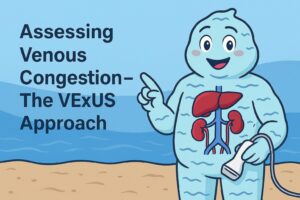Author: Erica Simon, DO, MHA (@E_M_Simon, EM Chief Resident, SAUSHEC, USAF) // Edited by: Alex Koyfman, MD (@EMHighAK, EM Attending Physician, UTSW / Parkland Memorial Hospital) and Brit Long, MD (@long_brit, EM Attending Physician, SAUSHEC, USAF)
Welcome to EM@3AM, an emdocs series designed to foster your working knowledge by providing an expedited review of clinical basics. We’ll keep it short, while you keep that EM brain sharp.
A 57 year-old female with a previous medical history of rheumatoid arthritis (RA) (adalimumab and glucocorticoid therapy) presents to the ED for weakness and lethargy. The patient denies chest pain and shortness of breath. She denies a familial history of coronary artery disease, smoking, hypertension, hyperlipidemia, diabetes, and a personal/familial history of thyroid pathology. ROS is negative for recent hospitalization, recent illness, sick contacts, and foreign travel.
VS: HR 135, BP 81/62, RR 18, T103.1 Oral, SpO2 97% room air.
Physical exam: Toxic appearing obese female, GCS 15, A&O x3, no focal neurologic deficits, lungs CTAB, abdomen benign.
EKG: Sinus Tachycardia, normal axis, no acute ST-T wave changes.
Two peripheral IVs are obtained. Fluid resuscitation and broad-spectrum antibiotics are initiated. VBG reveals a lactate of 4.2.
UA: nitrite positive, leukocyte esterase positive, 3+ bacteria.
After 2L of NS, the patient’s HR is 131, her BP 80/63. Norepinephrine is initiated with minimal improvement in her MAP.
What do you suspect as a diagnosis? What’s the next step in your evaluation and treatment?
Answer: Acute Adrenal Insufficiency1-3
- Precipitating Causes: Acute stress or illness in any patient who has been receiving glucocorticoid therapy or in those diagnosed with conditions associated with adrenal insufficiency (metastatic cancer, AIDS, tuberculosis).1
- May also be a manifestation of previously undiagnosed chronic adrenal insufficiency.
- Presentation: Consider in individuals with unexplained fever, abdominal pain, and orthostatic hypotension, or in patients experiencing shock refractory to vasopressors. 1
- Evaluation:2
- Utilize the H&P to direct evaluation and treatment (rule out underlying etiologies: infection, myocardial infarction, etc.)
- Accucheck: evaluate for hypoglycemia
- CBC: normochromic, normocytic anemia; relative lymphocytosis common
- VBG: frequently mild metabolic acidosis
- CMP: pre-renal azotemia
- Primary adrenal insufficiency: look for hyponatremia and hyperkalemia
- Secondary adrenal insufficiency: look for hyponatremia
- Utilize the H&P to direct evaluation and treatment (rule out underlying etiologies: infection, myocardial infarction, etc.)
- Treatment:
- 50-100mg hydrocortisone IV or IM every 6 hours1
- D5NS PRN
- Pearls:
- If adrenal insufficiency is suspected, initiate glucocorticoid therapy as soon as possible. Improvement following steroid administration suggests the diagnosis.1
- A random serum cortisol level is of little utility:3
- Cortisol is released in a pulsatile fashion demonstrating diurnal variation.
- The administration of etomidate has been shown to decrease cortisol production.
- Hypoalbuminemia (common in the critically ill) lowers cortisol-binding globulin (CBG) resulting in a decreased total cortisol measurement.
- Corticosyn/Synacthen (Synthetic ACTH) Stimulation Testing is the standard screening test for diagnosis and should be considered upon specialty consultation.
- Hydrocortisone therapy should be continued until stimulation testing is performed.1
References:
- Barthel A, Willenberg H, Gruber M, Bornstein S. In: Endocrinology: Adult and Pediatric. 7th ed. Philadelphia, Saunders Elsevier. 2016; 1763-1774.e.4.
- El Fassi D, Nielsen G. Hyperkalemia: A clue to the diagnosis of adrenal insufficiency. Circulation. 2013; 128: 2620-2621.
- Hamrahian A, Oseni T, Arafah B. Measurements of serum free cortisol in critically ill patients. N Engl J Med. 2004; 350: 1629-1638.
For Additional Reading:
Adrenal Crisis in the ED:









1 thought on “EM@3AM – Acute Adrenal Insufficiency”
Pingback: emDOCs.net – Emergency Medicine EducationEM Boards Survival Guide: Endocrine/Metabolic 1 - emDOCs.net - Emergency Medicine Education